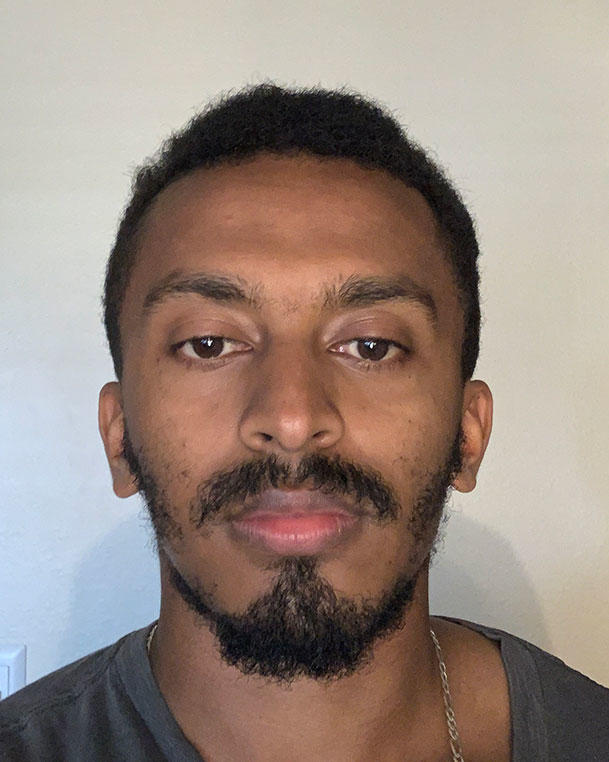Degrees: M.P.H. in Cancer Epidemiology from George Washington (GW) University
Years at DCEG: 2018-2021
DCEG Title: Postbaccalaureate Fellow
Current Title: Doctoral candidate in the Gillings School of Global Public Health, University of North Carolina (UNC), Chapel Hill
Who was your mentor at DCEG? What did you work on?
Maria Teresa Landi, M.D., Ph.D., was my mentor in the Integrative Tumor Epidemiology Branch during my fellowship in DCEG. Before coming to the United States, I was in medical school in Ethiopia for almost a year. I moved here to expand my educational opportunities. When I worked under Dr. Landi, I assisted with her research on lung cancer in never smokers by coordinating the collection of clinical and questionnaire data from ten labs and then cleaning and harmonizing the data. With the help of Shahinaz Gadalla, M.D., Ph.D., I also worked with Clinical Practice Research Datalink to look at the potential associations between medications and medical condition with lung cancer outcomes.
What is your current position?
I am a graduate research student in Epidemiology and Cancer at the Gillings School of Global Public Health, University of North Carolina, Chapel Hill. Under the mentorship of my UNC advisor, Dr. Melissa Troester, I study the association of exercise and sedentary behavior with breast cancer recurrence. So far, I have passed my qualifying exams and am moving towards writing my dissertation proposal. I have also applied to the NCI iCURE Scholars program to continue working with NCI investigators.
How do you apply the skills you developed at DCEG in your current job?
My training at NCI has helped me in my doctoral work because it expanded my analysis skills and gave me experience with literature reviews, manuscript composition, and applying for data access. NCI helped develop the foundational skills for excellence in a career as a cancer scientist in research.
I enrolled at UNC to improve my methodological knowledge. I am learning more about time-to-event analysis and deepening my knowledge of molecular epidemiology.
Do you have any memories from your fellowship that you would like to share?
Being amongst a supportive cohort of fellows and the support they had for each other was a great part of my experience. Jackie Lavigne, Ph.D., M.P.H., Director of the Office of Education, was especially helpful in applying for grad school. Her door was always open and I felt at ease to speak my mind. I also really enjoyed going out for happy hours with fellows and connecting with fellows. Everyone was applying to grad school programs together, and talking about that was stimulating. My fellowship gave my the confidence and competence to apply to UNC/graduate school and to be able to lead my own independent research.
What was your favorite project you worked on during your fellowship?
I loved the feeling of excitement when I submitted a project to present at branch meetings, conferences, or other events. Presenting work to the branch and receiving feedback was very informative and helped prepare me to presenting my Master's thesis at GW. I also presented was a scoping review on latent class analysis of physical activity and sedentary behavior at the annual meeting of International Society for Physical Activity Measurement Behavior, where I had the opportunity to meet and interact with many postdocs and investigators in this field. It was a great experience.
What do you do in your free time?
Bodybuilding! Today is leg day, but my weekly routine includes a variety of physical activity, including cardio, strength training, soccer, and basketball. My physiology professors really made an impression on me and ingrained the importance of physical activity. I enjoy applying my knowledge of nutrition and physical activity, even on the cellular level, to improve my lifestyle, and helping advise friends and family on these topics. Family and friends have changed their lifestyle for the better as a result, and this was very rewarding to see.
Do you have any advice for current or future DCEG fellows?
I would say it is very important to learn to manage your time, and to stay optimistic and patient. Accepting that you will make mistakes is difficult but also important and can help you clarify for yourself what you can and can't do. To get the most out of the mentorship experience, meet with your supervisor early on to establish the expectations of the working relationship with them, like determining the regularity of your meetings, setting a precedent for open discussions about research and career goals; you can also ask them to help you reassess expectations throughout your fellowship. I would recommend having a big-picture check in meeting at least every 2-3 months. Lastly, I would say to collaborate with other postdocs who have worked with your same mentor and to establish a good working relationship with the rest of the team.
How was the World Health Organization?
While I interned at NCI, I took some time off to do a 7-week internship at WHO in Geneva, in the Communicable Diseases Department. It was exciting because I worked for different people from all over the world on global surveillance data, e.g. flu data by season.
What was lunch in Geneva like?
Great! You can easily cross the border to France. Also, the museums are great.
How were you funded for the WHO internship?
George Washington University had a partnership with WHO, so I did it for my Master's practicum.
Where do you hope to work in the future?
A guiding light for me has been the hope to eventually return to East Africa to work. Probably after a doing postdoc somewhere, I hope to return there either as an independent investigator or to work in private industry.
